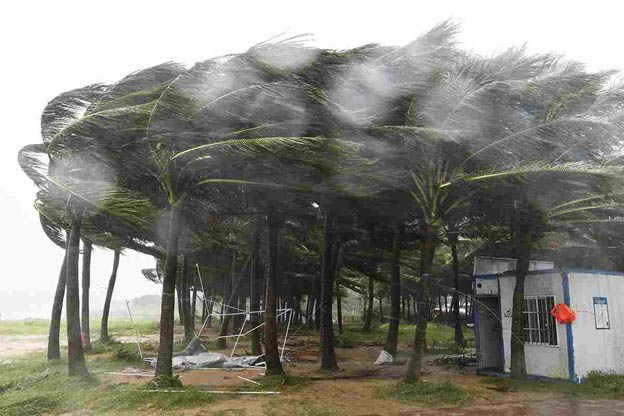HONG KONG/BEIJING, (Reuters) – Asia’s strongest storm this year, Super Typhoon Yagi, landed in China’s Hainan yesterday, bringing violent gales and heavy rain that triggered widespread power outages, paralysing the tourist island province known as “China’s Hawaii”.
Packing maximum sustained winds of 234 km per hour (145 mph) near its centre, Yagi registers as the world’s second-most powerful tropical cyclone in 2024 so far, after the Category 5 Atlantic hurricane Beryl, and the most severe in the Pacific basin this year.
After more than doubling in strength since killing 16 people in the northern Philippines earlier this week, Yagi slammed into the city of Wenchang in Hainan on Friday afternoon.
A little more than an hour after Yagi’s arrival, Hainan saw power outages that affected 830,000 households in the province, the official news agency Xinhua said.
The provincial power supply department had put together a 7,000-member emergency team that would embark on repairs as soon as conditions permitted, Xinhua added.
By Friday night, power to 260,000 households had been restored.
Ahead of Yagi’s arrival, the island known for its sandy beaches and glitzy hotels had cancelled flights and ferries, shuttered businesses, and told its population of more than 10 million to refrain from going out.
The typhoon had already shut schools, businesses and transport links in Hong Kong, Macau and Guangdong province as well as airports in Vietnam, which it is predicted to hit, along with Laos, over the weekend.
On Friday night, Yagi crossed Qiongzhou Strait north of Hainan and made its second landfall in Guangdong with winds still exceeding 200 kph.
In Guangdong, more than 574,500 people had been evacuated from areas at risk by noon, more than two-thirds of them from the city of Zhanjiang.
In the financial hub of Hong Kong, the stock exchange was shuttered while schools remained closed.
Hong Kong’s airport authority said operations had largely returned to normal after 50 flights were cancelled on Thursday, and the city of over 7 million people also lowered its typhoon warning by a notch after midday, as Yagi moved west towards Vietnam.
The world’s longest sea crossing, the main bridge linking Hong Kong with Macau and Zhuhai in Guangdong, also reopened on Friday afternoon after being shut since Thursday.
However, intense rainbands associated with Yagi will still bring heavy squally showers to the territory. Neighbouring Shenzhen issued the highest alert for rains.
RARE LANDFALL
Yagi is the most severe storm to land in Hainan since 2014, when Typhoon Rammasun slammed into the island province as a Category Five tropical cyclone. Rammasun killed 88 people in Hainan, Guangdong, Guangxi and Yunnan and caused economic losses of more than 44 billion yuan ($6.25 billion).
“The typhoon has not been as severe as initially feared and has so far caused minimal damage as the typhoon made landfall in Hainan (and not Guangdong),” said Qizhao, a banana farmer at the village of Gaozhou, who was initially worried Yagi could destroy months of hard work.
He said villagers had been reinforcing their trees with poles to protect them from the wind.
Still, Qizhao was not letting his guard down until after the typhoon has passed.
Formed over the warm seas east of the Philippines and following a similar path to Rammasun, Yagi arrived in China as a Category Four typhoon, ushering in winds strong enough to overturn vehicles, uproot trees and severely damage roads, bridges and buildings.
Its landfall in Hainan is rare, as most typhoons landing on the duty-free island are classified as weak. From 1949 to 2023, 106 typhoons landed in Hainan but only nine were classified as super typhoons.
No fatalities have been reported so far in Hainan.
Typhoons are becoming stronger, fuelled by warmer oceans, amid climate change, scientists say. Last week, Typhoon Shanshan slammed into southwestern Japan, the strongest storm to hit the country in decades.
Yagi is named after the Japanese word for goat and the constellation of Capricornus, a mythical creature that is half goat, half fish.








